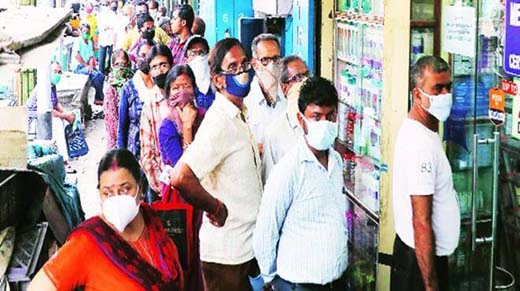Has COVID-19 pushed us to the ‘Edge of Chaos’?
Has COVID-19 pushed us to the ‘Edge of Chaos’?
mangaloretoday.com
By now, it is sure, COVID has pushed us to the ‘Edge of Chaos’ to come out of our complacencies and inefficiencies that we had accumulated over the years and will learn to settle to a new height with some newly acquired skills along with many others, including fiscal prudence too.

Frugal spending habits: this would be our new normal in personal finance planning henceforth. This pandemic has changed the way we perceived our living until it arrived. We have to fast adopt a new way of living to sustain collectively. We lived in a world of EMI in search of better living, that definition of better living has to change now. EMI market will shrink. Bankers are worriedly working on promoting new products. Reverse repo rate reduction indicates what economic sentiment is prevailing in the country . Bankers dislike lending money at this point in time, quite rational and justified from a business viability and sustainability point of view.
FMCG markets are trying to reach far-flung locations to remain relevant. Automobile market at the starting segment seeing some positive vibes, representing the basic need during pandemic and immediate post pandemic situation in the country.
Splurging will not be there for some time now, in our shoping lexicon.
Globally the effect of recession is prevalent too. The current fiscal format may not be sufficient to support life and livelihood. To promote a sustainable economic model, a new normal definition of financial efficiency has to emerge.
’More Rupees per Rupee’ is a concept we should assess before making any spending decision. Every expense that we will be making henceforth should have some merit. Impulsive spending should cease to exist in our bucket list. Return on investment does not apply to personal finance. Post pandemic situations, personal finance will have minimal scope for savings. Therefore, the tangible valuation of “more rupees per rupee” is not necessary to manifest the financial prudence in the major spending decision we will take. But there is a scope to assess the intangible valuation of the prospective expenditures.
Every expense which is not routine in nature needs practical efforts to analyze their merit before incurring them.
Personal finance includes mostly two types of spend—a routine expense and an unusual expense. The Routine expenses are defined expenditures and mostly fixed amounts with slight variation occasionally. These expenses are required to sustain our basic need of day to day living. Unusual expenses, on the other hand, are those we could not foresee or don’t plan in advance. There may be emergency expenses, the outcome of the impulsive purchasing decision, emotional support expenses, etc. These unusual expenses are converted to planned expenditure through EMI most of the time to avoid a budget deficit.
Therefore, sequencing our needs with the pecking order of preference, including intensity of choice, will help us to analyze the merit of expense.
No doubt, this will teach us the habit of ‘deferring consumption.’
S.K.Nag.
BEE certified Energy manager & Freelance writer.
- Need For ‘Students, Alcohol and Drugs’ survey
- New Synthetic Drugs Trapping Youth
- Mood Modifying Chips - Future of Drug Use
- Ramping up Indo-Bangla border security
- IITM- A premier educational Institution in a forest. What can we learn?
- Former PM, Manmohan Singh: Notable laws passed under his tenure
- Hashish on Ratnagiri Seashore
- The Poor cry out to Us: Do we respond?
- Clandestine Meth Labs Sprouting Across India
- Hydro ganja from Bangkok latest craze among youth in India
- "Memories to Treasure" Dr.Michael Lobo’s new book
- Dominance of Private Universities: Will it make education inaccessible to underprivileged students?
- Monti Phest: A rich heritage of South Canara
- Kashmir Bhavan in Bengaluru: A must visit place
- "MAI and I" Book of Angelic Emotions
- Draupadi Murmu - The New ’President of India’
- Anthony Ashram in the city grows a classic museum
- First College of Fisheries in India - A Golden Jubilarian
- Flushing Meadows - A Vintage Mansion
- The Colonel’s Bequest
- A Mangalorean PM and his RBI Governor Brother: The Extraordinary story of the Benegal Brothers
- There is no higher religion than Truth: Theosophical Society
- L’affaire - Ashu & Yiju of Mangalore
- Mangalore in Kowloon
- 1568 to 2018 AD: 450 years of Christianity in Mangaluru
- Vice President elect Naidu moves on from nadir to zenith, the phenomenal journey
- Embracing the Outdoors: How Heated Jackets Are Revolutionizing Cold Weather Activities
- Efficient and Sustainable Packaging Solutions with FIBCs
- The Hybrid Kilt Revolution | Where Tradition Gets Trendy
- Affordable Elegance | Embrace Style on a Budget with Cheap Kilts
- Unleashing Style and Functionality | Exploring Tactical Kilts
- Mangalore’s Heroic Lady marks 105th Birthday
- Santa the Christmas spirit
- Geriatric care: Mangalore strikes a fine balance
- The Don Who Made Two Empires to Clash
- CHITRAPUR SARASWATS - A Great Kanara Community
- Our new President Ram Nath Kovind’s significant journey to Rashtrapathi Bhavan
- Marriages made in heaven, big fat weddings made in India
- Eid insight - The giver of glad tidings
- CITY INFORMATION
- TRAVEL
- TOURIST INFORMATION
- HEALTH CARE
- MISCELLANEOUS




 Write Comment
Write Comment E-Mail To a Friend
E-Mail To a Friend Facebook
Facebook Twitter
Twitter  Print
Print 


